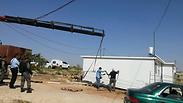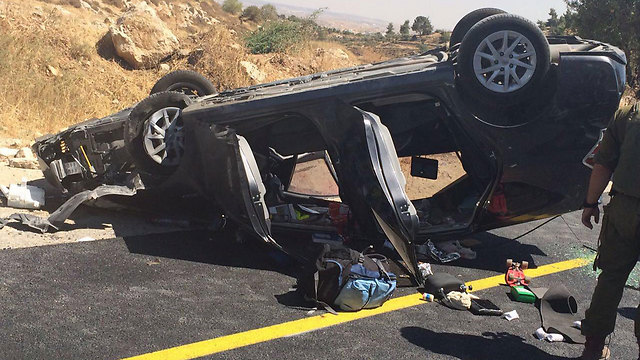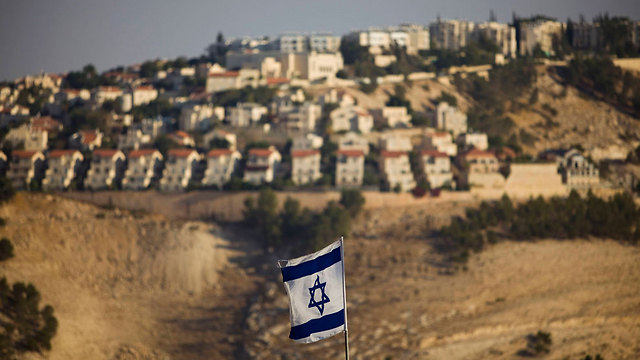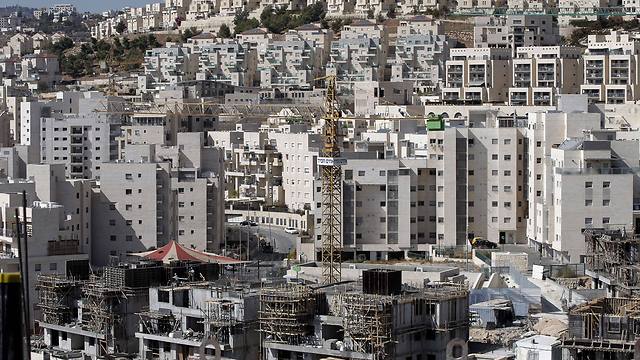
Quartet report criticizes Israeli settlements, Palestinian terrorism
Awaited report on Israeli-Palestinian conflict questions if Israel truly desires two-state solution; Palestinian Authority is called out for failing to 'consistently and clearly' condemn terrorist attacks.
The report by the Quartet entities sponsoring the stalled peace process—the United States, Russia, the European Union and the United Nations—said the Israeli policy "is steadily eroding the viability of the two-state solution."
"This raises legitimate questions about Israel's long-term intentions, which are compounded by the statements of some Israeli ministers that there should never be a Palestinian state," according to the eight-page report.
Amid a spike in violence, the Quartet criticized Palestinian leaders for "not consistently and clearly" condemning terrorist attacks and said illicit arms buildup and militant activities in Gaza—controlled by Islamist group Hamas—must stop.
Diplomatic sources said the report carries significant political weight as it has the backing of close Israeli ally the United States, which has struggled to revive the peace talks amid tensions between Israeli Prime Minister Benjamin Netanyahu and US President Barack Obama.
Relations between the rightist Israeli leader and the Democratic president have yet to recover from their feud over last year's US-led nuclear deal with Israeli foe Iran.
Netanyahu's office welcomed some aspects of the Quartet report but said Israel took issue with numerous factual and policy assertions. The report also "perpetuates the myth that Israeli construction in the West Bank is an obstacle to peace," the statement said.
The response lamented the Palestinian media's reaction to the murder of Hallel Yaffa Ariel on Thursday: "Yesterday a 13 year-old Israeli girl was stabbed to death while she slept in her bed. Not only did the Palestinian Authority fail to condemn this gruesome murder, it referred to the murderer as a “martyr” in official media.
"Palestinian praise for murderers today inspires those who will strike tomorrow. This response reflects the moral bankruptcy of the Palestinian leadership and leaves little doubt about its true intentions.
"Israel therefore welcomes the Quartet’s recognition of the centrality of Palestinian incitement and violence to the perpetuation of the conflict. This culture of hatred poisons minds and destroys lives and stands as the single greatest obstacle to progress towards peace."
Nabil Abu Rdainah, the spokesman for Palestinian President Mahmoud Abbas, expressed disappointment with the Quartet report.
"Any report that does not include the full withdrawal to the 1967 borders, including occupied Jerusalem, and does not include a recognition of the illegality of settlement will not lead to real and lasting peace and will lead to more tension and more instability in the region," he said in a statement.
UN Middle East envoy Nickolay Mladenov briefed the UN Security Council on Thursday on the report and said it would be up to the council and the international community to use the report to decide the way forward.
A senior US State Department official said on Friday: "We are open to having the Security Council welcome the report, but that's all at this point. We're not looking for serious, substantive, UN Security Council action on this report."
Halt incitement
The Quartet said urgent affirmative steps needed to be taken to "prevent entrenching a one-state reality of perpetual occupation and conflict."
The report said Israel had taken for its exclusive use some 70 percent of Area C, which makes up 60 percent of the occupied West Bank and includes the majority of agricultural lands, natural resources and land reserves.
Under the Oslo accords of the mid-1990s, Israel retains full control over Area C, where large tracts have been declared closed military areas.
"Israel should implement positive and significant policy shifts, including transferring powers and responsibilities in Area C," the Quartet report said.

It said only one permit for Palestinian housing construction in Area C was reportedly approved in 2014, while there did not appear to have been any approved in 2015.
The report said at least 570,000 Israelis are living in the settlements, which most countries deem illegal.
"Israel should cease the policy of settlement construction and expansion, designating land for exclusive Israeli use and denying Palestinian development," the report recommends.
The Palestinians want an independent state in the West Bank, Gaza and East Jerusalem—areas Israel captured in the 1967 Six-Day War. The last round of peace talks broke down in April 2014, and Israeli-Palestinian violence has surged in recent months.
Since October, Palestinian street attacks have killed at least 33 Israelis and two visiting Americans. Israel has killed at least 201 Palestinians, 136 of whom it said were assailants. Others were killed during clashes and protests.
"The Palestinian Authority should act decisively and take all steps within its capacity to cease incitement to violence and strengthen ongoing efforts to combat terrorism, including by clearly condemning all acts of terrorism," the Quartet said.
In response to violence this week, Netanyahu's office further announced that Palestinian Authority payments to terrorists and their families be deducted from tax revenue transfers to the PA.
The Palestinian Authority transfers funds to terrorists by various laundering methods; the more severe the acts of terrorism, the greater the amount of funds. Netanyahu has ordered that the entire amount of support for terrorists and their families be deducted from the tax revenues that Israel transfers monthly to the Palestinian Authority.
A statement from the Prime Minister's Office explained, "Israel believes that the encouragement of terrorism by the Palestinian leadership – in the form of both incitement and payments to terrorists and their families – constitutes incentive for murder."
The Palestinian Authority headed by Abbas is based in the West Bank, while Hamas has been in control of Gaza since 2007. The Quartet said Gaza and the West Bank "should be reunified under a single, legitimate and democratic Palestinian authority."












